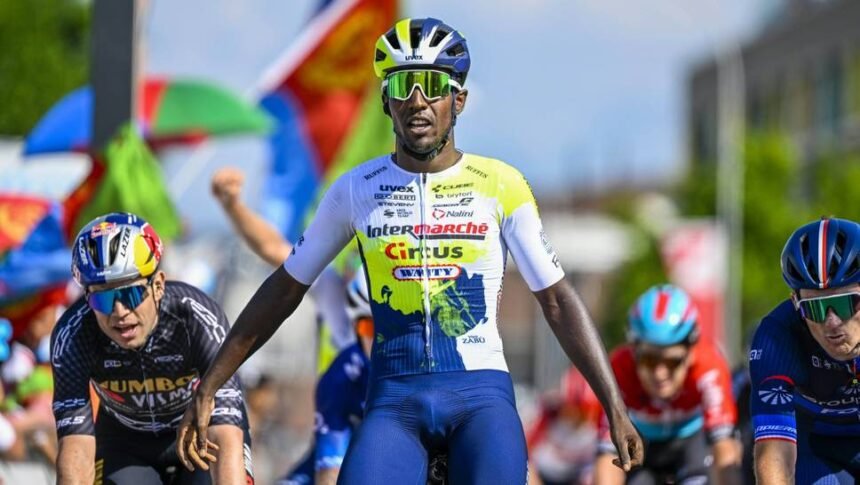Biniam Girmay made Tour de France history on Monday by becoming the first Black African to win a stage in the French Grand Tour. This significant achievement comes two years after he accomplished a similar feat at the Giro d’Italia. However, Girmay’s victory should prompt reflection on why it has taken so long for cycling to reach this milestone. Despite his success, he remains the only Black rider among 176 cyclists in the Tour de France.
Girmay’s victory on Monday was historical. At 24 years old, he not only became the first Black African but also the first Eritrean and the first Intermarché-Wanty rider to win a stage at the Tour. His history-making journey began in 2022 when he won a stage at the Giro d’Italia, making him the first Black African to win a stage in any Grand Tour. Earlier that year, he had already become the first Black African to win a Classic at Gent-Wevelgem.

The joy following his victory was immense and well-deserved, potentially marking a watershed moment for the predominantly white and Europe-centric sport of cycling. Girmay’s triumph can inspire an entire continent, but he cannot be the sole representative of diversity in the sport. The cycling community must not become complacent, thinking the job is done. There is still much work needed to make the sport more inclusive and accessible to individuals from diverse backgrounds and non-traditional cycling countries.
Currently, Girmay is one of only three African riders in the Tour de France peloton, with the other two being white South Africans, Ryan Gibbons and Louis Meintjes. In the broader context of the 524 male WorldTour riders, there are just five Black Africans, including Henok Mulubrhan (Astana Qazaqstan), Amanuel Ghebreigzabhier and Natnael Tesfatsion (both Lidl-Trek), Welay Hagos Berhe (Jayco AlUla), and Girmay. While there are other non-white and non-European riders, white Europeans still dominate the sport.
Several barriers hinder the increase of Black African cyclists. Visa issues pose a significant challenge, with many young African cyclists being denied entry to Europe due to stringent immigration and work regulations. This makes it nearly impossible for aspiring cyclists from countries like Eritrea, Rwanda, and Ethiopia to train and compete in Europe.
Although the rise of data and technology in cycling, such as the Zwift Academy, offers new pathways into the sport, these opportunities often require reliable internet access, which is still out of reach for many in developing countries. Girmay himself has shared experiences of using unstable internet connections at cafes to communicate with his coach, highlighting the basic entry barriers.
Cycling remains an expensive sport to enter, requiring substantial investment in equipment, training, and time. This economic barrier keeps it predominantly a middle-class activity in Europe and even more so globally. The sport continues to be overwhelmingly white and European-centric, and while Girmay’s victory is significant, it should not be seen as the end of the journey towards inclusivity.
Girmay’s success is indeed historic, but it is also a testament to his perseverance and talent. His win has opened the door for others, but there is still much to be done to ensure that door remains open. Reflecting on his victory, Girmay expressed his disbelief and gratitude, saying, “Ever since I started cycling, I’ve always dreamed of being part of the Tour de France – but now, to win in my second year in a big bunch sprint, is unbelievable. I just want to thank my family, my wife, all the Eritreans, and Africans. We must be proud, now we are really part of the big races. This win is for all Africans, congrats, I’m just super happy today.”
After his momentous win, Girmay also acknowledged his team’s efforts, stating, “In the end, our team did a really good job. In the last kilometre, I lost Gerben’s wheel, so I went for it myself. To win against the fastest in the world is unbelievable – and massively motivating.”
Following his victory, Girmay posted on social media, “Let me open the door,” signalling his hope for a more inclusive future in cycling. His achievement is a call to action for the cycling community to continue working towards greater diversity and representation.










